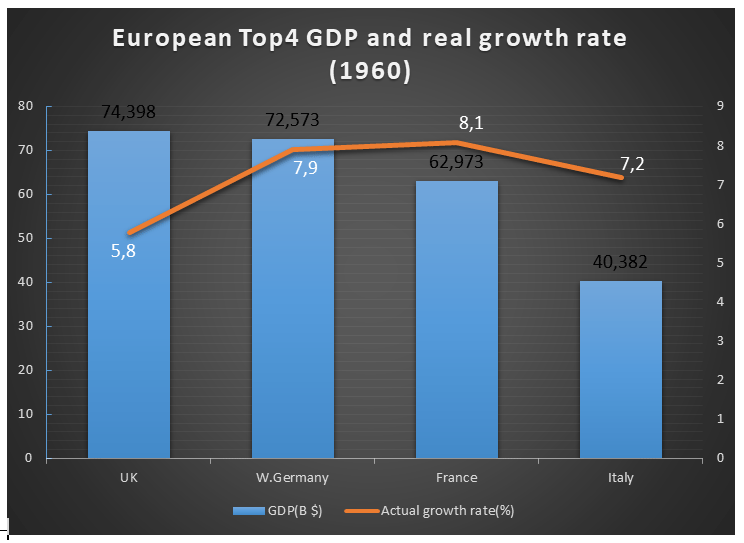The following article has been exclusively prepared for LeapRate by AETOS’ analyst Ryan Chen.
Introduction

Ryan Chen
The turbulent situation caused by the 2016 Brexit referendum has carried over into 2019. The pound has not yet completely rebounded from the collapse triggered by the crazy referendum, and the process of Brexit appears more difficult than anyone expected, due to various stubborn but conflicting interests as well as other internal and external causes. This paper endeavors to provide a comprehensive analysis and discussion of the historical causes, historical background and current situation of Brexit.
The Lonely Overlord of Western Europe
The disagreement between Britain and continental Europe has an age-old basis. During most of the time, Britain’s relations with the nations of continental Europe have been far from friendly, which could be attributed to four main reasons:
Located at the northwest edge of the continent, Britain is separated from the rest of Europe by the English Channel, which, at its narrowest, is just 21 miles (34 km) wide. However, the Strait isolates Britain from most of the European continent.
- For centuries Britain was the most powerful country in Europe. However, due to the unique geographical relationship, even a unified continental Europe would not see Britain become its political and economic center. Therefore, Britain wants most to see a Europe with the nations restraining each other, in which case it can act as an arbiter. This explains why Britain has long implemented the policy of continental equilibrium and “glorious independence.”
- A look at history shows that Britain had staged wars with several major European powers, such as its rise on the shipwrecks of the Spanish Armada, the three Anglo-Dutch wars that crushed the Dutch Republic at its prime, the seven anti-French alliances that led to the defeat of the French emperor Napoleon, an alliance with France to defeat the rapidly rising czarist Russia, and its effort to incite the wild Germany to invade the Soviet Union.
- Thanks to its North Sea oil fields, Britain has become one of the few European countries of energy self-sufficiency. It is free from energy dependence on others, notably Russia.
Geographical isolation, a long history of war, energy self-sufficiency, arrogant policies (e.g., glorious independence) and prejudice against the continental powers have all contributed to the current situation Britain faces.
The EU’s Special Underachiever
The establishment of the European Economic Community (now the European Union) in 1957 was hailed by France, Italy, the Federal Republic of Germany, the Netherlands, Belgium and Luxembourg, but that enthusiasm was not shared by the hegemonic state of Western Europe, Britain. As a world power with the largest GDP in Europe and the second-largest in the world, Britain, three years later, had to descend to apply for membership, which was only to be vetoed by France.
Britain, by the year 1960, was far behind West Germany, France and Italy in GDP growth, and even the other three countries of the European Community showed great economic vitality. The changes in Britain’s position with respect to the European Community, from its initial arrogance to its subsequent eagerness, were due to the desire for power and profitability. There is little wonder that the other nations gave “special treatment” to the EU’s special underachiever.
It was in 1973, when Britain joined the European Community, that the first oil crisis occurred, striking a heavy blow to the economy of continental Europe and Britain. The British government, venting its anger on the rest of Europe, launched the first Brexit referendum in 1975, which was eventually opposed by more than 67% of the British public. In 1985 the Schengen Agreement, aiming to abolish border checks at the signatories’ common borders, was signed in the absence of Britain. In 1995, when the EU established the euro as a single currency, Britain was absent.
As an important member of the EU, Britain appears early to highlight its particularity, as witnessed by the rejection of a single currency, declining the signature of the Schengen Agreement, not participating in the EU’s crisis-relief program, opposing almost all financial regulatory policies and claiming to leave the EU to protect itself when the EU is in crisis.
Britain, a country in pursuit of pragmatism and self-interest, has proved to be a consistently dormant, unstable element within the EU.
End of Part I
Disclaimer:
The information contained in this website is of general nature only and does not take into account your objectives, financial situation or needs. Please ensure that you read the Financial Services Guide (FSG), Product Disclosure Statement (PDS), and Terms and Conditions which can be obtained on our website https://www.aetoscg.com.au, and fully understand the risks involved before deciding to acquire any of the financial products listed on this website.
AETOS Capital Group Pty Ltd is registered in Australia (ACN 125 113 117; AFSL No. 313016) since 2007 and is a wholly owned subsidiary of AETOS Capital Group Holdings Ltd, carrying on a financial services business in Australia, limited to providing the financial services covered by the Australian financial services licence.
Trading margin FX and CFDs carries a high level of risk and may not be suitable for all investors. You are strongly recommended to seek independent financial advice before making any investment decisions.
This commentary is owned by AETOS, and copying, reproduction, redistribution and/publishing of this material for any purpose in whole or in part without the prior written consent of AETOS is prohibited.
